Contents
- Botanical description of St. John’s wort
- The composition and useful properties of St. John’s wort
- The use of St. John’s wort in medicine
- St. John’s wort treatment: the best recipes
- Treatment of the stomach with St. John’s wort
- Treatment of vitiligo with St. John’s wort
- Treatment of sinusitis with St. John’s wort
- Treatment of the liver with St. John’s wort
- Treatment of gastritis with St. John’s wort
- Treatment of alcoholism with St. John’s wort
- St. John’s wort treatment for depression
- Contraindications and side effects of St. John’s wort
Botanical description of St. John’s wort
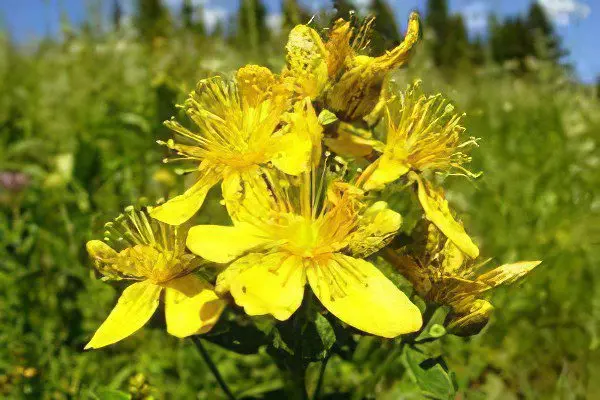
One of the most effective plants in therapeutic practice is St. John’s wort, or ordinary. This medicinal herb grows up to 30-70 cm, blooms in June-August with small yellow flowers. The most favorable habitats are light forest glades and dry meadows. For medicinal purposes, leafy tops of the plant with inflorescences are used. It is best to collect them from the very beginning of flowering, since during this period the content of useful substances is maximum.
In nature, there are several types of herbs called St. John’s wort. There are shrubs with this name, and even small trees. St. John’s wort (perforated) and St. John’s wort tetrahedral are used in folk medicine. They differ both externally and in healing properties very slightly.
In the Middle Ages, there was a belief that St. John’s wort is able to protect against evil spirits, ghosts and witches. He was put to the child in the crib or hung from the cradle. It was believed that in this way the baby would have good dreams, and the evil spirit would not scare him.
On the fresh grass of St. John’s wort, girls wondered about love: they crushed the stems in their hands, if the juice was red, then the feeling was mutual, if it was colorless, then the chosen one was indifferent.
St. John’s wort was taken with them on the road, it was believed that it would protect against the attack of wild animals and robbers.
There are many legends about the origin of St. John’s wort. So, among the Christian peoples, its appearance is associated with the death of John the Baptist. When his head was cut off, St. John’s wort grew in place of drops of blood that had fallen to the ground. Therefore, according to the Slavic tradition, this plant is called “Ivan’s blood.”
The composition and useful properties of St. John’s wort
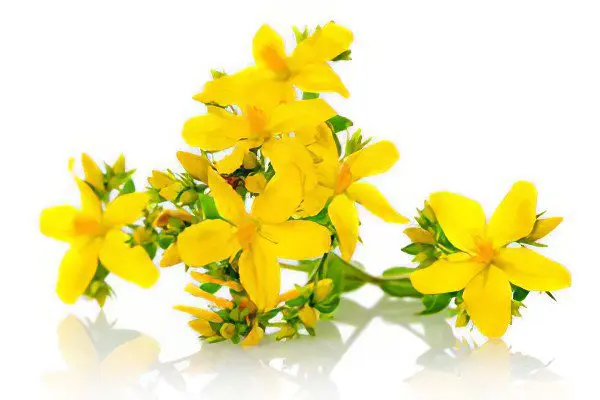
St. John’s wort has many useful substances, due to which it has healing properties. The plant contains flavone compounds (rutin, quercetin, etc.), ascorbic and nicotinic acids, saponins, sugars, carotene, tocopherol, hypericin, cetyl alcohol, choline, hyperoside, phytoncides, essential oil, tannins, resinous and bitter substances. Healing components make it possible to use this medicinal plant quite widely. It is used as an antibacterial, antiseptic, analgesic, wound healing, antirheumatic, diuretic, choleretic, astringent, antihelminthic, and also as a regenerating drug.
Since ancient times, infusions of St. John’s wort, prepared with water, have been used to treat heart diseases, rheumatism, colds, flu, headaches, diseases of the liver, stomach, bladder, bedwetting, hemorrhoids, and inflammation of the female genital organs.
And only recently, medical scientists discovered another useful property of St. John’s wort. Clinical studies have shown that the plant has a positive effect on the nervous system and has an antidepressant effect. This makes St. John’s wort even more valuable, since it has almost no contraindications and does not cause side effects, unlike sedative drugs of chemical origin.
Consider the composition of St. John’s wort in more detail:
Tocopherol is vitamin E, which is necessary to protect the body from the damaging effects of free radicals;
Carotene is a precursor of vitamin A. It is necessary for the proper functioning of the eyes, the renewal of skin cells, and the fight against viruses and bacteria;
Tannins help cleanse wounds from infection, relieve inflammation, accelerate healing;
Nicotinic acid is necessary for the proper functioning of the heart and nervous system;
Vitamin C increases immunity, promotes the restoration and renewal of cartilage, ligaments, maintains skin turgor, and prevents the degeneration of normal cells into cancer cells;
Hypericin and hyperforin are special substances that have an antidepressant effect;
Hyperoside and rutin strengthen the walls of blood vessels;
Phytoncides are plant “antibiotics” that have a powerful antimicrobial effect.
Such a combination of biologically active substances in the composition of a medicinal plant allows it to be used in the treatment of many diseases.
St. John’s wort in cosmetology
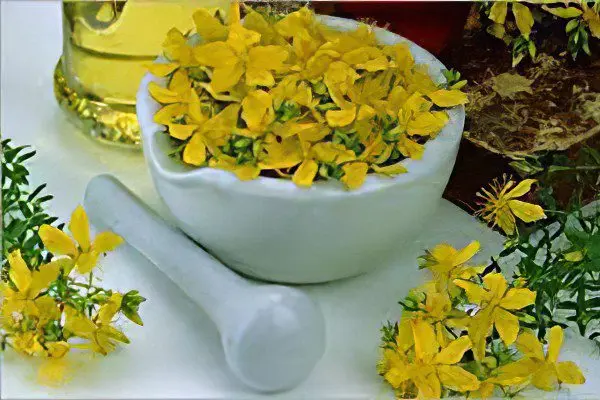
This healing herb has proven itself well in the beauty industry. It has an anti-inflammatory, tonic, anti-aging and anti-seborrheic effect.
St. John’s wort is successfully used for:
acne;
Increased oily skin;
Withering and wrinkles;
Baldness and dandruff;
Pustular skin diseases;
Cracked heels.
Acne
With abundant acne on the skin of the face, daily evening washings with infusion of St. John’s wort are recommended. To do this, you need to take 1 tablespoon of chopped dried herbs, pour 1 cup of boiling water and leave for 20 minutes. You need to wash yourself with infusion every night before going to bed, do not get wet with a towel, do not rinse, let it dry on the skin.
Read more: Acne – what is it? Types of acne, causes and treatment methods
Increased oiliness of the skin
If a greasy sheen quickly appears on the skin, a strong decoction of St. John’s wort will help you. Two tablespoons of dried grass should be poured with one glass of boiling water, put on a slow fire and cook for 10 minutes. After cooling, strain and wipe the face with a cotton pad, let dry, rinse with cool water.
You can make a mask from steamed St. John’s wort. To do this, pour two tablespoons of raw materials with four tablespoons of boiling water, stir, let it brew. The resulting slurry is applied to a cleanly washed face, avoiding the area around the eyes. Keep the mask on for 10-15 minutes. Wash off with cool water. Do no more than twice a week.
Withering and wrinkles
Ice rubbing and lotion based on St. John’s wort will help restore skin tone. For ice rubbing, it is necessary to prepare a decoction of St. John’s wort (see the recipe above), cool, strain and freeze, spilling into special molds for ice. Every morning after washing, it is recommended to wipe the face and décolleté area with a piece of ice.
To make a lotion, you need to mix 1 cup of St. John’s wort (see recipe above) and mix with 1 tablespoon of vodka. Wipe the face and décolleté after washing in the evening before going to bed.
Baldness and dandruff
With baldness, one third of a glass of St. John’s wort should be taken orally 10 minutes before meals 2 times a day. To get rid of dandruff, it is necessary to rinse the hair after washing with St. John’s wort, prepared according to the above recipe.
Pustular skin diseases
In case of pustular diseases, the skin is wiped with a decoction of St. John’s wort. To prevent the spread of infection to healthy areas, washing is carried out with a cotton pad. The disk should be moistened in a decoction, squeezed out slightly, treated with wetting movements on the skin in an area with a radius of not more than 3 cm, discard the used disk, take a clean one. Repeat the entire procedure on the next skin area.
Cracked heels
To alleviate the condition, foot baths are shown. To do this, you need to prepare 2 liters of decoction at the rate of 4 tablespoons of chopped herbs per 0,5 liters of boiling water, cook over low heat for 5 minutes. Pour into a small basin, cool to a temperature of 45 ° C (hot, but tolerable), lower your legs and hold until the broth cools.
Read more: Causes and treatment of cracked heels
The use of St. John’s wort in medicine
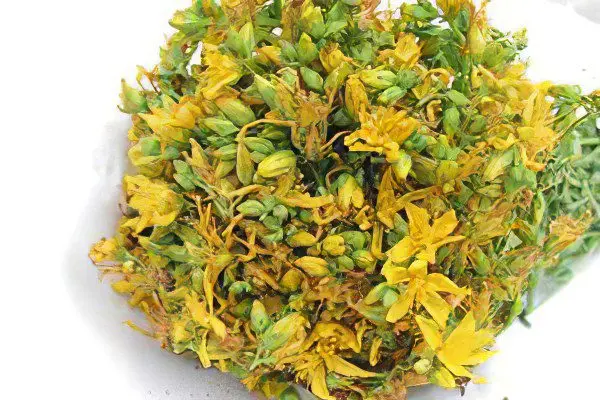
The active substances in which St. John’s wort is rich made it “a herb for 99 ailments.”
Classical medicine
In official medical practice, they use both dried raw materials – St. John’s wort, and medicines made on its basis.
The plant is used in the following conditions:
Inflammatory diseases of the oral cavity (inflammation of the gums, tonsillitis, pharyngitis, stomatitis);
Diseases of the biliary tract and digestive tract (dyskinesia, hypotension of the gallbladder, hepatitis, cholecystitis, bloating, low stomach acid, diarrhea);
Depression, insomnia, increased anxiety.
The effectiveness of this medicinal herb in inflammatory diseases of the oral cavity is due to the content of a large amount of tannins, phytoncides and beta-carotene.
Based on the extract of St. John’s wort, the preparation Novoimanin was made. It is indicated for purulent skin diseases – abscesses, phlegmon, infected wounds, burns, inflammation of the pharynx, sinusitis. Its effectiveness is so high that it is able to suppress the growth of even Staphylococcus aureus, which is resistant to penicillin preparations.
The choleretic effect and the ability to normalize intestinal motility with flatulence and diarrhea is associated with the content of essential oil in the plant.
The ability of St. John’s wort to eliminate manifestations of depression is well known. Numerous studies have shown that in patients with mild depressive states, the effectiveness of drugs based on St. John’s wort is even higher than that of classical antidepressants. In addition, the herbal preparation does not cause drowsiness, lethargy, does not affect the ability to drive a car, does not reduce the reaction rate. St. John’s wort-based antidepressants improve mood, relieve anxiety, and cause a surge of vitality. The official St. John’s wort medicines for depression, anxiety, irritability, and restlessness are the German drug Gelarium Hypericum and the Russian herbal remedy Negrustin, which are sold over-the-counter.
ethnoscience
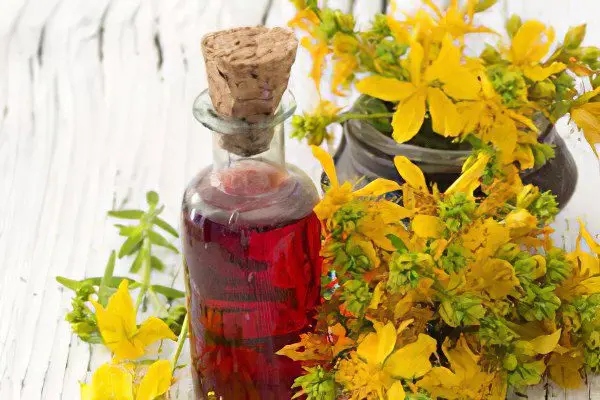
Herbalists recommend treatment with St. John’s wort for the following diseases:
Gastritis;
Heartburn;
Cardiopalmus;
Gallstone disease, inflammation of the gallbladder, hepatitis, including viral;
Arthritis, joint pain;
skin infections, burns;
mental illness, including depression;
Sinusitis;
Alcoholism.
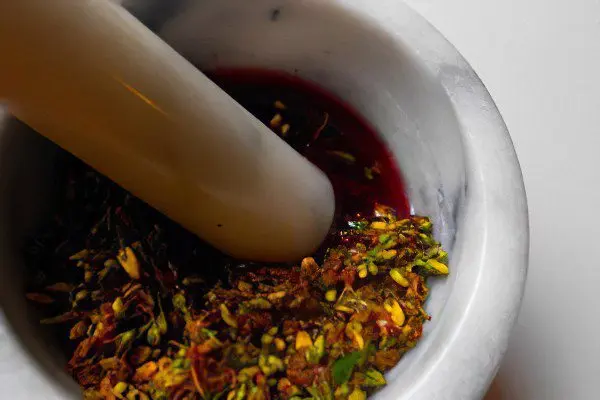
Most often, St. John’s wort is used in the form:
Opens;
Water infusion;
Alcohol tincture;
Healing tea.
All of them can be made at home.
Herbal preparations are very popular, which, in addition to St. John’s wort, include other medicinal plants. Fees act more efficiently and faster due to the summation of useful properties.
As a raw material for the preparation of dosage forms of St. John’s wort, dried herb purchased at a pharmacy can be used. It is sold in bulk in cardboard boxes or in the form of filter bags. It is best to use grass in bulk.
If desired, you can prepare St. John’s wort yourself, if it is possible to collect the plant away from major roads, factories, factories, railways.
St. John’s wort should be collected during its flowering. Plants are cut with a knife close to the ground. Dried upside down, tied in bunches. When drying, direct exposure to sunlight should be avoided, it is better if it is a shaded place (canopy, attic).
St. John’s wort treatment: the best recipes

It is very important to remember that this medicinal plant can seriously harm, and to understand this, it is enough to carefully read the name. Therefore, before starting treatment, it is best to consult a doctor. As a rule, fresh grass is used as an external agent. To do this, crush the leaves and inflorescences, which promote the healing of wounds, ulcers and bruises, and are used as lotions for sore spots – for example, with allergies, rashes, and also after insect bites. You can add a little honey and use the plant as a bandage to treat joints or lower back.
Quite rarely, freshly squeezed juice from St. John’s wort is used. Since it is difficult to get the right amount of juice, infusions, tinctures, decoctions, ointments and oils are more often prepared.
Hypericum infusion: to prepare the infusion, you need to take 2 tablespoons of chopped fresh herbs or 1 tablespoon of dry, and pour 200 ml of boiling water over it. Leave for 3-4 hours in a dark place, after which the remedy can be used 15 ml 3 times a day before meals to get rid of gastritis, normalize the acidity of gastric juice, with colitis, cystitis, cholelithiasis, headache, to improve venous circulation, increase blood pressure, etc. For colds or infections of the oral cavity, a rinse from the infusion of St. John’s wort is used. For the treatment of inflammation on the skin, lotions or compresses are prepared with the same remedy. The infusion is used to treat skin diseases in children, adding it to the bath when bathing.
John’s wort decoction: it is used in much the same way as the infusion. To prepare a decoction, you need an enamel pan or heat-resistant glassware. Take 1,5 tablespoons of grass and pour it with a glass of hot water. After that, the container with brewed grass is heated in a water bath for 20-30 minutes, but do not boil. A decoction of St. John’s wort is used externally for washing, rubbing the skin, rinsing the hair, inside – for intestinal infections, diarrhea.
Hypericum tincture: St. John’s wort is insisted on vodka or alcohol in a ratio of 1:7 or 1:10, left in a dark place for three days or more. Use the drug should be mixed with water: one teaspoon per 50 ml of water. This medicine is also used for rinsing the mouth and for inhalation. Alcohol tincture is very effective as a warming compress for muscle or joint pain.
For external use prepare an ointment or oil. Such a tool promotes the healing of wounds, ulcers, bruises, sprains, etc. An ointment is prepared by mixing animal fat, petroleum jelly or a fat baby cream with evaporated extract of St. John’s wort or dry grass powder.
St. John’s wort oil: it can be prepared as follows: take one part of the flowers and infuse in two parts of olive, almond or peach oil for three weeks. Such a drug is used as oil compresses to treat ulcers, burns or wounds.
To prepare the medicine, you can also take ordinary vegetable oil, add dried herb and infuse for 5 days (in a ratio of 1: 1,5). If the healing oil is prepared on the basis of fresh herbs, then the proportions are 1: 1. In the villages of Siberia, this oil is widely used to treat gums and oral mucosa (in case of stomatitis or gingivitis).
Hypericum tea. It is prepared in the same way as a hot infusion. 1 teaspoon of St. John’s wort is poured into the teapot and 1 cup of boiling water is poured. Linden blossom, a spoonful of honey or a handful of strawberries can be added to tea. Tea is used not as a remedy, but as a prophylactic to strengthen the immune system.
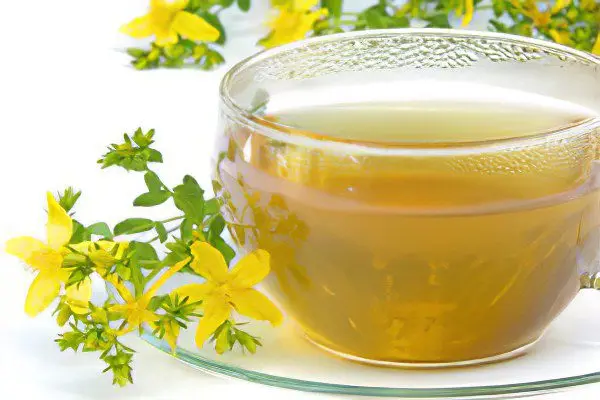
There are many traditional medicine recipes based on St. John’s wort. Here are the best ones.
Treatment of the stomach with St. John’s wort
If gastritis is accompanied by severe pain, then the use of herbal collection is possible. To prepare the infusion, you will need one part of meadowsweet herb, nettle and St. John’s wort. Herbs need to be folded into a dry jar, mix thoroughly with a wooden spoon. Then take 1 tablespoon of the resulting mixture, pour into a teapot and pour 200 ml of boiling water. Insist 1 hour. Drink half a glass 5 times a day before meals.
If, along with gastritis, heartburn is disturbing, then the collection of plants will help: 1 tablespoon of St. John’s wort, sudweed, yarrow. Add all ingredients to 1 liter of water. Let it brew for 2 hours, take half a glass half an hour before meals or when an attack of heartburn begins.
Treatment of vitiligo with St. John’s wort
Vitiligo is a disease in which, for unknown reasons, in certain areas the skin loses its pigment – melanin, in this place white spots of a rounded shape appear. In severe cases, they slowly grow, merging with each other and capturing more and more areas of the body. Vitiligo most often affects open areas of the skin: face, neck, décolleté, hands. The spots do not hurt or itch.
For a long time, St. John’s wort has been used to treat vitiligo. In the fight against this disease, an infusion of herbs and ointment were used:
Infusion for the treatment of vitiligo. To prepare the infusion, you need to take 1 teaspoon of dried St. Take 1 tablespoon in the morning, afternoon, evening before bedtime for 1 weeks. After an 3-day break, repeat the course of treatment. Do this until the total number of courses is 8;
Ointment for the treatment of vitiligo. Collect fresh St. John’s wort flowers, tamp well into a glass jar “up to the shoulders”. Pour in cold-pressed vegetable oil, olive oil is best, as much as it takes. Expose in the sun for 2 weeks. Collect fresh St. John’s wort flowers again, pack tightly into a jar, pour over the squeezed oil from the first portion. Insist 2 weeks. Collect the flowers again in a jar and pour over the squeezed oil from the second portion. Do this 5 times. By the end, the vegetable oil will turn into a thick, viscous liquid resembling a cream. Lubricate them with vitiligo spots once a day, leave until completely absorbed. Wash off the residue after 1 minutes with warm water.
Read more: Vitiligo – causes, stages, what is dangerous, how and how to treat vitiligo?
Treatment of sinusitis with St. John’s wort
For the treatment of sinusitis with St. John’s wort, you will need a decoction of this herb (see the recipe above). Before washing, drip vasoconstrictor drops into the nose to relieve swelling and give access to healing water to the sinuses.
Rinse the nasal cavity with warm decoction of St. John’s wort 3 times a day. After the procedure, it is good to blow your nose with both nostrils at once. The course of treatment is 7 days. Irrigation can be done with a syringe without a needle. Tilt your head over the sink, draw a decoction into the syringe and inject it into the nostril. Spit out the secreting liquid.
Read more: Sinusitis in adults – causes, signs and symptoms
Treatment of the liver with St. John’s wort
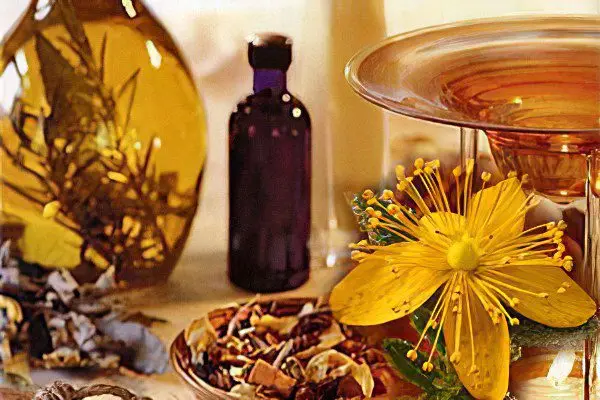
With congestion in the gallbladder, cholecystitis, it is necessary to stimulate the secretion of bile. An infusion of St. John’s wort will cope well with this task (see the recipe above). In the morning after waking up, drink 0,5 cups of infusion on an empty stomach. Have breakfast in half an hour. During the day, take 2 tbsp. l. after each meal, but not more than 5 times a day. The duration of treatment is 7 days.
Read more: Liver disease – causes, symptoms and treatment
Treatment of gastritis with St. John’s wort
The infusion of the plant helps with exacerbation of gastritis. To prepare the infusion, you will need 1 tablespoon or 1 filter bag of St. John’s wort herb, brew them in a glass dish with 1 cup of boiling water. Leave to infuse for about 1 hour. Drink 15 ml (1 tablespoon) before each meal.
Read more: Gastritis – causes, signs and symptoms
Treatment of alcoholism with St. John’s wort
To evoke a feeling of disgust for alcohol, a strong decoction is prepared with the help of St. John’s wort. Pour four tablespoons of chopped dry grass with 2 cups of boiling water, heat in a water bath for half an hour. Cool down. Drink 2 tablespoons in the morning and evening before meals. Reception must be conscious, that is, there will be no effect if you add a decoction to food without the knowledge of the patient. The course of treatment is 14 days.
St. John’s wort treatment for depression
Since those components of the medicinal plant that have an antidepressant effect are poorly soluble in water, St. John’s wort tincture is the best drug in the treatment of anxiety and mood disorders. You can cook it at home. The recipe is posted above. To get rid of depression, take 10-12 drops of tincture 3 times a day before meals. The duration of treatment is 1 month.
Read more: Sedatives for adults
Contraindications and side effects of St. John’s wort
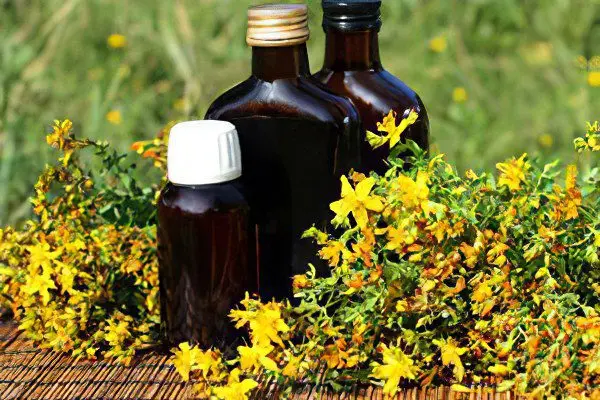
St. John’s wort refers to slightly toxic plants. If this herb is used for a long time, unpleasant sensations may appear in the liver area, sometimes a feeling of bitterness in the mouth.
The main side effects and contraindications are:
Photosensitivity is an increased sensitivity of the skin to ultraviolet radiation. Therefore, those who receive treatment with St. John’s wort should not be in direct sunlight for a long time;
The plant causes an increase in blood pressure, so patients with hypertension should consult a doctor before starting treatment with this herb;
Substances contained in St. John’s wort can cause rejection of a transplanted organ. Therefore, patients who have undergone an organ transplant or graft implantation are prohibited from using medicines based on this plant;
Women taking birth control pills should remember that St. John’s wort reduces their contraceptive effect, so an unwanted pregnancy is possible;
Prolonged use of this medicinal plant can cause a weakening of potency in men, which disappears after the drug is discontinued;
Drinking decoctions and infusions of St. John’s wort for more than 1 month in a row can cause an increase in the liver;
In patients with mental illness, this herb can cause an exacerbation of manic syndrome. The same effect can occur while taking St. John’s wort with other antidepressants. Patients may begin hallucinations, convulsions, confusion, in severe cases, coma may occur;
St. John’s wort should not be taken simultaneously with antibiotics, as it contributes to a more rapid removal of the drug from the body, as a result of which the effect of antimicrobial therapy is reduced;
Another important note: St. John’s wort is able to halve the blood content of a very important AIDS drug called Indinavir. Given this circumstance, people with AIDS should not use St. John’s wort. In addition, the plant significantly reduces the effect of anticoagulants and heart drugs, so it is better not to use it together with these drugs;
Older people using modern antidepressants, St. John’s wort should be taken especially carefully. The combination of this medicinal herb with antidepressants can lead to dizziness, confusion, anxiety and migraine attacks;
St. John’s wort should be used with caution in people who require anesthesia, as this plant can prolong or enhance the effects of some pain medications. Therefore, before the introduction of anesthesia, it is very important to inform the doctor about the use of St. John’s wort. Recent studies of the plant have shown that some components of the plant also have a negative effect on the optic nerve.
Can St. John’s wort be used during pregnancy?
Since this plant is famous for its healing properties, the question often arises, can expectant mothers use it? It is strictly contraindicated to use St. John’s wort inside while carrying a child and breastfeeding, since St. John’s wort can negatively affect the course of pregnancy, and also gives a bitter taste to breast milk.
External use in the form of ointments, rinsing, washing is allowed for women at any gestational age.









